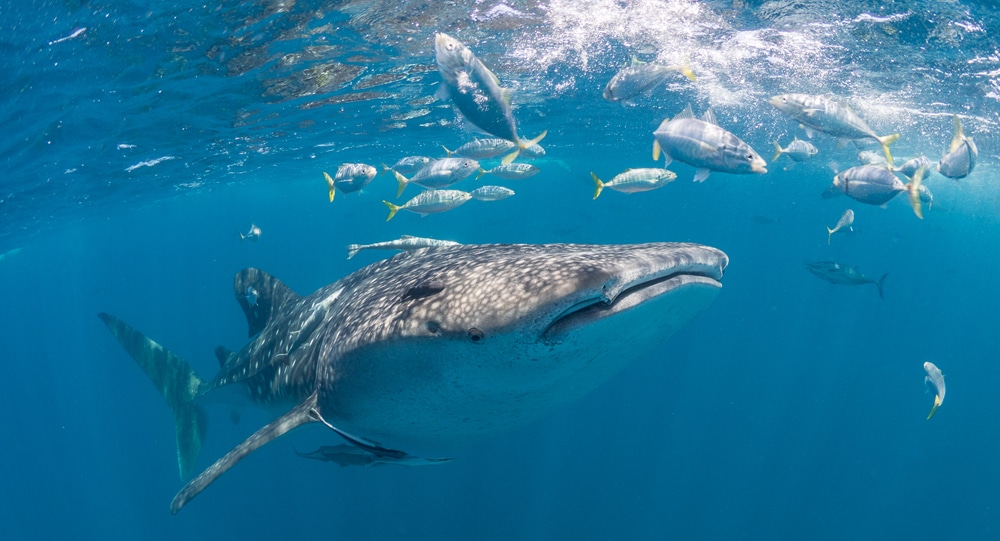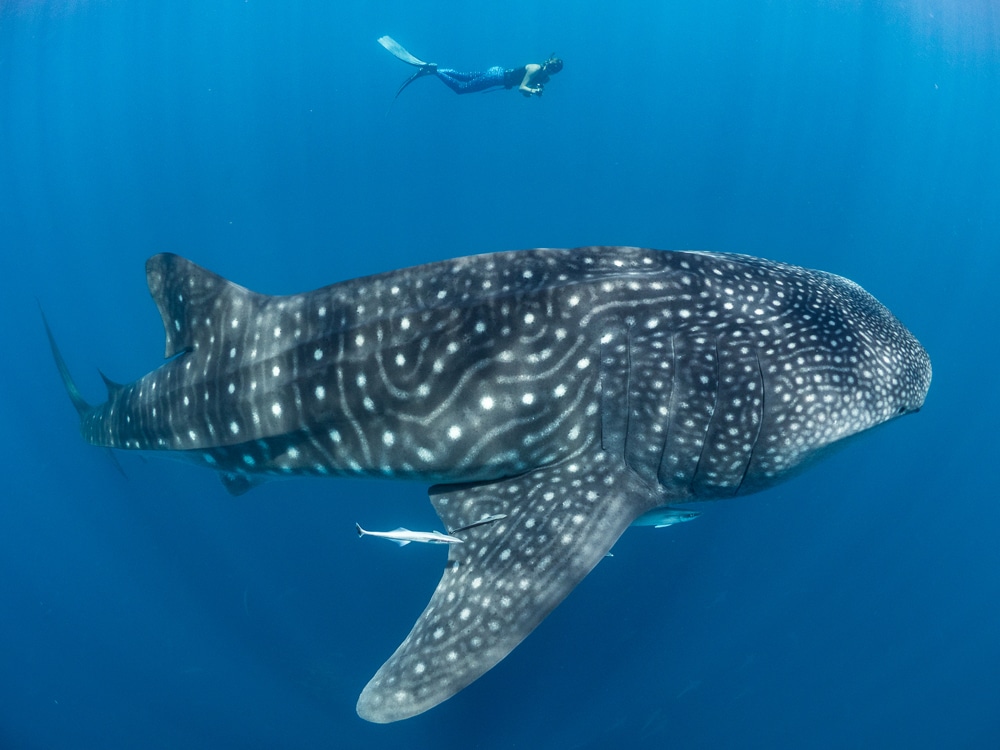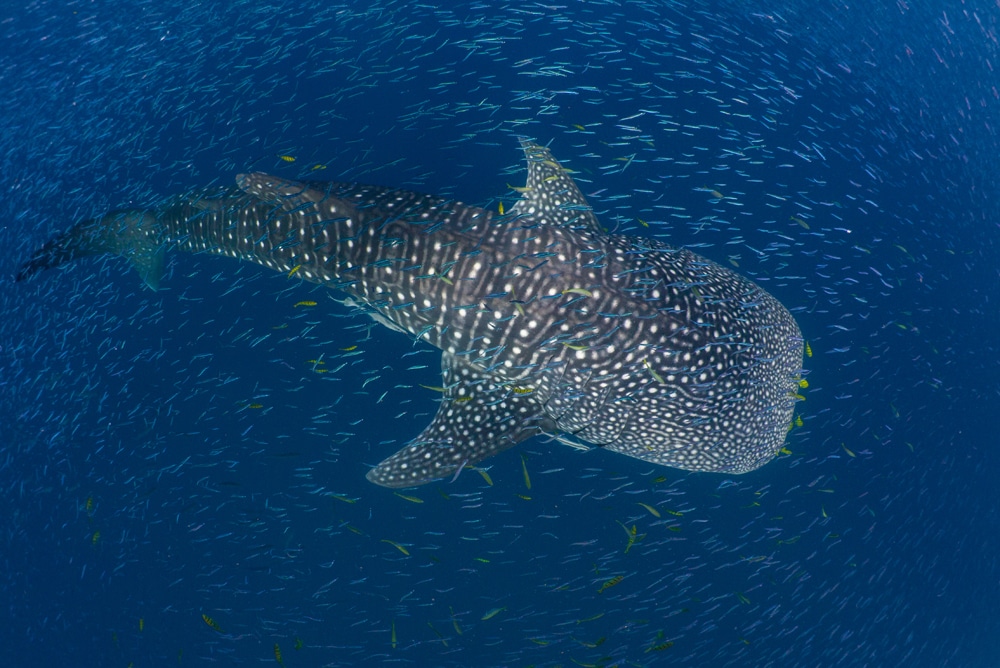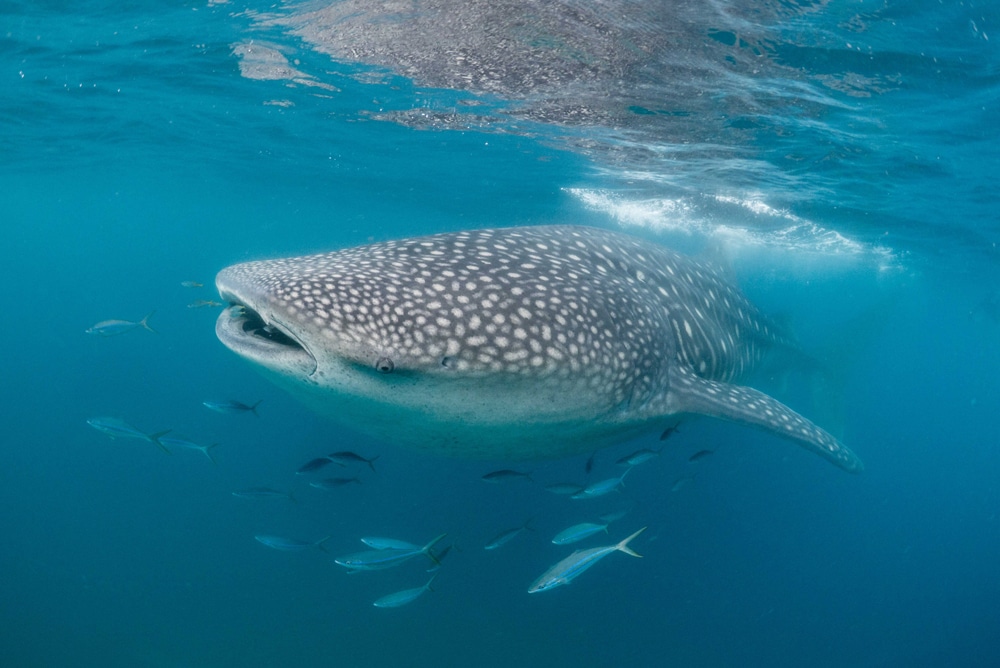Marine Life & Conservation
Dr. Simon Pierce seeks global protection for Whalesharks

Dr. Simon Pierce, co-founder of the Marine Megafauna Foundation (MMF), has launched a new Patreon crowdfunding campaign to help create global protection for the Earth’s largest fish: the endangered whale shark.
Patrons will receive unprecedented access to Simon and MMF’s expert whale shark team’s work. They’ll receive private access to the team’s latest findings, long before they’re published. They’ll have the opportunity to join researchers in the field via live streams and regular updates, and have priority access to join expeditions to iconic locations such as the Galapagos Islands and Komodo National Park. Donors interested in supporting whale shark conservation can choose from the range of tiers available, starting from just $3 per month (tax deductible for US residents):
- PENGUINS ($3 or more per month): Full access to all updates, including live streams from the field, photos and videos, see the latest scientific results as they come in, and chat to the team directly about what they mean. Basically, you can watch and laugh as MMF scientists totally geek out.
- SEA TURTLES ($9 or more per month): Full access to updates (see above), and you get to adopt your very own whale shark! You’ll receive personalised updates when your shark is seen again.
- MANTA RAYS ($49 or more per month): Full access to updates, adopt your very own whale shark, and you’ll also get free access to a bunch of upcoming content!
- WHALE SHARKS ($99 or more per month): All of the above… and you’ll get to name a whale shark of your very own! The scientists will photo-identify your shark for you and you can choose its name. Sharky McSharkface? No judgement.
- ERM… DOUBLE WHALE SHARKS ($199 or more per month): Our highest-level supporters ($200+ per month) will ALSO get a personal acknowledgement – if you’re amenable – on the team’s scientific publications, which is rather prestigious.
The new Patreon campaign offers a deeper way for people to invest in producing the science, education and conservation initiatives needed for whale sharks to recover.
Whale sharks, the world’s largest fish, can grow up to about 20 m (65 ft) in length and reach around 40 tons in weight. These plankton-feeders are totally harmless to humans and it’s possible to dive or swim with them in total safety. However, they are now a globally endangered species. Overfishing, accidental catches and ship strikes have killed more than half of the world’s whale sharks since the 1980s.
Simon and his team are working hard to help whale sharks recover. They collaborate with national governments to create and enforce effective protection for the species, partner with fishing communities to move towards sustainable fishing techniques, and promote best-practice ecotourism that benefits the sharks while also allowing people to swim with these gentle giants. The team have published 26 (and counting) scientific papers on whale shark biology, ecology and conservation, as well as innumerable articles for the interested public. They have extensive knowledge about how to help the species recover, but need support from the public to help them achieve their mission.
Dr. Simon Pierce, co-founder of the Marine Megafauna Foundation, said: “Our shark research and conservation work, underway since 2005, has been getting spectacular results. We’ve had amazing public support. I’m hugely proud of the work we’ve done to date.
“Funding these efforts, though, has been an ongoing struggle. So, we’re now building a community of supporters that share our desire to save Earth’s largest fish. We are asking members of the public to become part of this project, with donations from just $3 a month.
“You’ll be joining forces with a small, dedicated team of expert researchers that are working every day to make the world a better place. You’ll get personal updates from global leaders in marine biology and conservation, and you’ll be helping to save the world’s amazing marine wildlife. If you’re able to help, we’ll be super grateful. The whale sharks will be freakin’ stoked.”
For more information or to become a donor, please visit: https://www.patreon.com/simonjpierce.
Marine Life & Conservation
Paul Watson Released as Denmark Blocks Japan’s Extradition Bid

Renowned anti-whaling activist Paul Watson has been released from custody in Greenland after spending five months in detention. Denmark’s Justice Ministry rejected Japan’s request for his extradition, citing insufficient guarantees that his time already served in custody would be credited against any potential sentence.
The 74-year-old Canadian-American was arrested on July 21 in Nuuk, Greenland’s capital, when his ship docked to refuel. His arrest was based on a 2012 Japanese warrant related to a 2010 encounter in Antarctic waters. Japan alleged Watson obstructed operations and caused damage to a whaling research ship during efforts to disrupt illegal whaling. Watson has consistently denied these claims, maintaining his commitment to marine conservation.
Denmark, which oversees extradition matters for Greenland, concluded that while the legal conditions for extradition were met, the lack of assurances from Japan regarding time-served credit made extradition untenable.
In a video shared by his foundation, Watson expressed gratitude and relief, saying, “After five months, it’s good to be out… and good to know they’re not sending me to Japan.” He added that the most difficult part of his time in custody was being separated from his two young sons.
Watson is a pioneering figure in marine conservation, known for founding the Captain Paul Watson Foundation in 2022 after decades of activism with the Sea Shepherd Conservation Society. His bold efforts to defend marine life have earned him widespread support, including from celebrities and conservationists. His work has also been featured in the acclaimed reality TV series Whale Wars.
Watson’s lawyer, Jonas Christoffersen, praised the decision, stating, “We are happy and relieved that Paul Watson is now free.” He added that Watson is eager to reunite with his family and continue his vital work.
The arrest occurred while Watson’s vessel, the M/Y John Paul DeJoria, was en route to the North Pacific with a team of 26 volunteers to intercept a Japanese whaling ship. His foundation described the arrest as politically motivated and emphasized that Watson’s actions were focused on ending illegal whaling practices.
Japan resumed commercial whaling in 2019 after leaving the International Whaling Commission, asserting that whale meat is a cultural tradition. Conservationists, however, continue to challenge these practices, highlighting their impact on marine ecosystems.
Despite the challenges, Watson remains steadfast in his mission to protect marine life and bring attention to whaling practices. His dedication to ocean conservation has made him a globally respected advocate for the environment.
Marine Life & Conservation
12 Days of Zero-Waste Fish-mas

This holiday period, the Marine Conservation Society, the UK’s leading ocean membership charity, invites you to make some simple changes to eating fish this Christmas to help our seas.
Dr Kenneth Bodles, Head of Fisheries and Aquaculture at the Marine Conservation Society, said, “During the festive season, our consumption increases, but so does waste. Sustainability isn’t just about where food comes from – it’s also about how you use it. By reducing waste and making the most out of your seafood, you’re not only taking steps to be more ocean-friendly, but can also help to cut costs during what is often one of the most expensive times of the year”.
The Marine Conservation Society has compiled twelve tips on how to consume seafood sustainably with zero-waste this Christmas:
Buy whole fish instead of fillets
Instead of fillets, consider buying whole fish such as salmon, hake, or lemon sole. By adopting a “nose to tail” approach with cooking, whole-baked fish not only feeds a crowd, but also helps to minimise waste and maximise sustainability by using up every part of the animal, including bones, skin, and fat.
Make fish stock
Leftover fish bones or shells can be put to good use by boiling them to make a nourishing fish stock or bisque. This can be frozen and preserved for later use and makes for a flavourful base in a soup.
Make your own fish pâté
Avoid waste by turning leftover fish, such as smoked mackerel or salmon, into a delicious pâté by blending with cream cheese and lemon. Perfect when paired with crackers.
The sustainability of salmon and mackerel varies depending on where and how it is caught or farmed. For more information on green-rated options, check the charity’s Good Fish Guide.
Buy frozen
By purchasing seafood that is frozen or vacuum-packed, this helps to reduce waste by extending the shelf life of your food.
Fish pie
If you’re wondering what to do with leftover cooked fish, why not opt for a classic fish pie with mashed potatoes, leeks, and a cheesy sauce? A sure crowd pleaser on Boxing Day.
Use the head
Don’t forget the fish head! The meat is incredibly tender and flavourful. The charity recommends a cod’s head curry or recreating Fallow’s renowned cod’s head in siracha butter.
By stretching your ingredients further, not only is this a more sustainable way to enjoy seafood, but also cost-effective by repurposing leftovers and cooking creatively.
Boxing Day brunch
Mix leftover kippers or smoked salmon with scrambled eggs for a tasty, zero-waste, Boxing Day brunch.
For best choice, make sure you buy kippers, or herring, from the North Sea and the North Irish Sea.
Zero-waste storage
A top tip from the Marine Conservation Society to avoid waste is freezing fish offcuts to save for future use.
Crisp up the skin
Even leftover fish skin can be turned into a quick savoury snack by crisping it up in an air fryer with a little olive oil and salt.
Anchovies two ways
Leftover anchovies can either be blended with butter to make a delicious anchovy butter or tossed into pasta for a hit of umami flavour.
The charity recommends opting for anchovies caught in the Bay of Biscay for best choice.
Fishcakes
For an easy, zero-waste meal, leftover seafood trimmings can be mixed with mash and fried in breadcrumbs to make fishcakes.
Pickled mussels
Try pickling mussels in 1:1 vinegar and water, with a dash of sugar for a sustainable, zero-waste snack that can be enjoyed well beyond the festive season.
Mussels farmed in the UK are a seafood superhero. Grown using low-impact methods and harvested by hand, they get all the food they need from the sea around them. This makes them one of the most sustainable, ocean-friendly, and cost-effective seafood options.
Players of People’s Postcode Lottery have raised £6.6M towards the Marine Conservation Society’s vital work in making seafood more sustainable.
Laura Chow, Head of Charities at People’s Postcode Lottery, said: “Fish is a festive favourite for many, but making sustainable choices when it comes to how we buy and eat seafood makes all the difference for our ocean. Support from players of People’s Postcode Lottery has helped the Marine Conservation Society further its sustainable seafood work, so that we can all enjoy healthier, better protected seas.”
The Marine Conservation Society encourages you to make sustainable seafood choices a year-round habit, not just for Christmas. To check how sustainable the seafood on your plate is, you can visit the charity’s Good Fish Guide. The Guide helps consumers and businesses identify the most sustainable seafood using a simple traffic light system, based on where and how species are caught or farmed. Green is the best choice, amber means improvements are needed, and red indicates fish to avoid buying.
Zero-waste gift idea
Why not embrace a zero-waste Christmas by gifting a membership to support marine conservation? It’s a meaningful, low-waste gift that helps protect our ocean for generations to come. Memberships start from as little as £5 a month – the price of a sandwich and drink from your local coffee shop.
Find the latest sustainable seafood advice for wild-caught and farmed seafood on the Good Fish Guide, downloadable to your phone from www.mcsuk.org/goodfishguide.
-

 News3 months ago
News3 months agoIconic SS United States to become the World’s Largest Artificial Reef
-

 Blogs2 months ago
Blogs2 months agoScubaverse Christmas Gift Guide 2024: Day 4
-

 News2 months ago
News2 months agoSanta Divers take the Plunge for Charity
-

 Blogs2 months ago
Blogs2 months agoScubaverse Christmas Gift Guide 2024: Day 1
-

 News3 months ago
News3 months agoDiscover Turquoise Divers and Media Luna Beach & Dive Resort: A Premier Diving and Relaxation Destination in Roatan
-

 Blogs2 months ago
Blogs2 months agoScubaverse Christmas Gift Guide 2024: Day 5
-

 Blogs2 months ago
Blogs2 months agoScubaverse Christmas Gift Guide 2024: Day 2
-

 News3 months ago
News3 months agoToucan Diving at Plaza Beach and Dive Resort Bonaire Introduces PADI Mermaid Training






